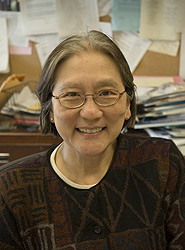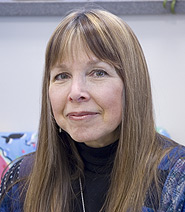Berkeleyan
 |
Inez Fung and Mimi Koehl are the subjects of two new books aimed at encouraging girls to study science. |
Researchers reach a new audience
NAS book series inspires 'tweens to take another look at science
![]()
| 08 March 2006
The National Academy of Sciences (NAS) recently introduced Women's Adventures in Science, a series of books, targeted to middle-school-age girls, that explore the journey of preeminent female scientists in anecdotally rich, biographical detail. Berkeley is well-represented in the series: Two of the 10 volumes take as their subjects a couple of our own - Inez Fung and Mimi Koehl.
Neither Fung, professor of earth and planetary science and of environmental science, policy, and management, nor Koehl, professor of integrative biology, knew exactly what they were committing to when they signed up for the project. Fung, who also co-directs Berkeley's Institute of the Environment, thought just one chapter of a book might be devoted to her work on climate change. Instead she spent many Saturday mornings detailing her life story to her NAS biographer, Renee Skelton.
 Inez Fung (Wendy Edelstein photo) |
Looking back on her life was "very strange," recalls Fung, who says she didn't know the project would involve delving into her baby pictures and personal story. "Because I'm a scientist, I'm not used to focusing on myself," she says. Reflecting on her past yielded an unexpected benefit for the 57-year-old researcher: It brought home the importance of friends and intellectual companionship in her life. "I was an undergraduate at MIT during the late '60s, when less than one percent of the class was women, but it didn't matter because we were in the same dormitory, and we had firm friendships and supported one another."
Fung, who along with Koehl was elected to the NAS in 2001, says that today, whenever she's at an impasse in her research, she can ask her friends in the sciences for help. "We ask questions and argue about new topics together, and that's very important, because things become clearer once we've talked them out," says Fung. "Science is very much fun and not a lonesome venture at all."
Wacky and fun
Koehl, who was on sabbatical last year at the University of Colorado, spent 10 consecutive afternoons with her NAS biographer, Deborah Parks, who visited her in Boulder where she was conducting research on the physics of how aquatic animals interact with the turbulent water flowing around them. Koehl recounted numerous science stories to Parks, who then chose specific ones based on their accessibility to younger readers. "I think she homed in on particular stories because they were wacky, fun, or understandable," she says.
 Mimi Koehl(Wendy Edelstein photo) |
Discussing her work with people unfamiliar with its underpinnings is not foreign to Koehl, since her studies lie at the intersection of physics, biology, and engineering. "I already have a hard time talking to biologists, because the physics part of what I do isn't accessible to most of them," says Koehl, who received a MacArthur Fellowship in 1990. "I think more than most scientists, I spend a lot of time trying to translate my quantitative, more esoteric work into something that someone who doesn't work in that area can understand."
Koehl, now 57, started off as an art major at Gettysburg College, a small, liberal-arts school in Pennsylvania, then switched her major to biology after taking an introductory course in that subject to fulfill a distribution requirement in science. She had an epiphany in the course, recognizing that her fascination with natural form could go beyond her use of it in her studio-art classes.
"When I took that biology class, I realized that scientists could figure out how those forms worked, which seemed much more compelling to me than using them to create images," she says.
Focusing on the flipside
While both women have had their brushes with sexism, neither one feels that focusing on the obstacles they encountered accurately reflects their whole stories. "There are always hurdles and challenges," says Fung. "I've spent the last 20 years researching the environment because I think the scientific topic is very interesting, and now, with global climate change a real and acknowledged threat, it's an urgent topic for society, not just scientists."
"So much that's written about women in science or other professions focuses on the struggles," says Koehl. "The flipside of the story is what motivates us to do science is how exciting and intriguing it is."
The 10 titles in the National Academy of Sciences' Women's Adventures in Science series, published by Franklin Watts in 2005, will be available in paperback this month. For information on the series, visit iwaswondering.org.

